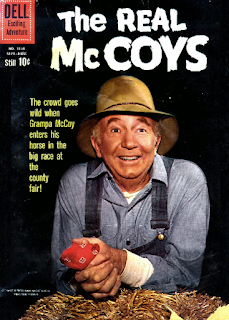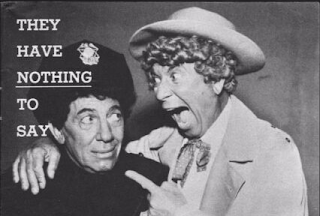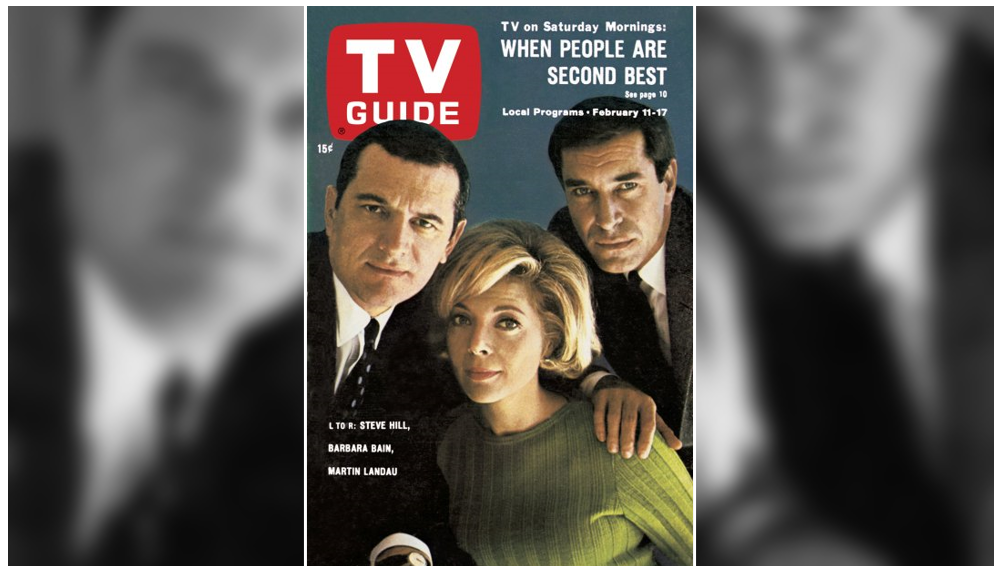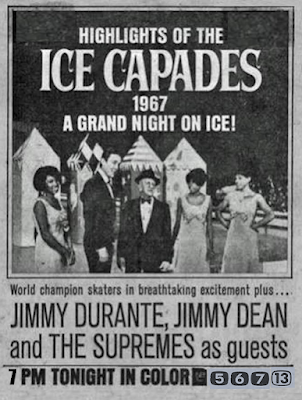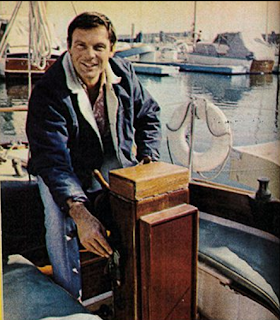Even the word sounds quaint, old fashioned. Smut. Sounds like something your grandmother might have warned you about, and if she'd been around in 1965, reading TV Guide, she might have felt justified after reading Leslie Raddatz's article—first in a three-part series—on "Smut in the Living Room."
It's one of the first articles we've seen that indicates a shift, perhaps ever so slight, toward sex replacing violence as the number one concern of television viewers. Raddatz suggests that this may be due to television's ever-increasing use of movies to fill in scheduling gaps. With those older movies that have been staples of broadcasting since the start comes the newer fare from Hollywood, which New York Times critic Bosley Crowther describes as containing "an unmistakable surge of sensuality and just plain smut." Two of the leading offenders of the moment are Kiss Me, Stupid, which Playboy (of all sources) described as "amateur night at a third-rate burlesque house" and The Carpetbaggers, described by Life as "An untalented leering paean to sex." Since this is a three-part article, we're not going to see a comprehensive analysis of the situation right away; indeed, in part one, Raddatz focuses his attention on two men in particular: Billy Wilder, the man who brought us Kiss Me, Stupid; and Joseph E. Levine, the producer of The Carpetbaggers.
Wilder came from humble origins—when he moved from Berlin to the United States, he initially lived in an unused ladies' lavatory of a hotel—and Raddatz wonders, in the psychoanalytical style of the times, if his desire to bend the boundaries of acceptability somehow constitute "a defense of his base beginnings." His movies tend to deal with "distasteful or single-entendre themes," such as adultery in Double Indemnity and The Apartment, alcoholism in The Lost Weekend, drag in Some Like it Hot, prostitution in Irma la Douce, and—raising the states—double adultery in Kiss Me, Stupid, which Life, in its put-down of the movie, said included "situations and a dialog that would generate blushes in a smoker car." Wilder, an opponent of censorship by "ladies' clubs in Nebraska," professes delight with television, since it gives those in movies "something to look down on."
Wilder won't discuss Kiss Me, Stupid, but Raddatz has plenty to say about Wilder, whose career and his work "have often verged on an, at best, unconventional and sometimes seamy borderline." Critics have addressed "the inner nihilism, the impatience and contempt for the audience" in many of his movies, and a former associate calls him "the only guy I know who could sneer 'Merry Christmas.' " Despite this, or perhaps because of it, he's one of Hollywood's most honored directors, with the Oscars to prove it.
 |
| Is this as hot as it gets while fully clothed? |
Levine, whose movies, like Wilder's, have won honors, has several already running on television: "Two Women, which involves the rape of a woman and her teen-age daughter, Room at the Top, which concerns adultery; A Taste of Honey, which deals with illegitimacy and homosexuality; and The Mark, which is about a suspected child molester." The movies run later in the evening, at 10:00 p.m. on Fridays and Saturdays, and carry with them a respectability that seems often to be absent from Wilder's films.
They also tend to spark less outrage than those of Wilder's, and Raddatz wonders if this might be the answer to a problem faced by television programmers. "The great thing," according to one Hollywood journalist, "is that television has taken over the place of program pictures and B pictures, so that good adult movies can be made. If these adult films can’t be shown on television, does it mean that all motion pictures are to be made at the level of the TV viewer?" In other words, the critics can focus their barbs on Kiss Me, Stupid and the like, allowing "worthwhile adult films in dignified fashion" such as Room at the Top and Two Women to be viewed as acceptable alternatives.
Or, he wonders at the conclusion of part one, when these new displays of smut turn up on television, will we see things come to a point? Will we see more self-regulation, or is the government, "—either through Congressional committees or the Federal Communications Commission—preparing to move into this sensitive area?"
The question before us is this: is For the People really for the viewers? Cleveland Amory is inclined to think so, although he concedes it may not be for all the people. But as a logical successor to The Defenders, he thinks this legal drama will do just fine. Like its predecessor, the show is long on realism, and desiring of topicality—even though its grittiness may, at times, come close to discouraging us. But, he says, if you stick with it, you won't be sorry.
For the People, as the title might suggest, takes the opposite tack from The Defenders (given that it's produced by the same people, comparisons are unavoidable), with William Shatner as assistant D.A. David Koster, an earnest, bulldog prosecutor, aided by his boss (Howard Da Silva), a friendly detective (Lonny Chapman), and his loyal wife (Jessica Walter), who sometimes wishes he could just let go of the job for awhile. It boasts an equally fine lineup of guest stars, all of whom turn in particularly fine performances. It is, Cleve says, as "equally exciting" as The Defenders, but "even more penetrating and engrossing."
As someone who, for the most part, appreciated The Defenders and, in fact, has seen a couple of episodes of For the People, I can sympathize, even agree, with much of what Amory says. Where we part company, though, is in the matter of the show's star. Amory sees Shatner as "right up there in the big leagues with David Janssen, Robert Lansing, Vic Morrow and Richard Crenna," to which I can only scoff. This is not to be unduly harsh on the Shat, but I've always felt that he was almost always the weak link in every production he's appeared in. In For the People, as in most of his roles, he comes across either as overly intense, or so over the top that you'd think he was working behind a deli counter, he's hurling so much ham around. I know a lot of you might not agree with me on this, but to suggest that he's in the same league as those other actors is probably the funniest thing I'll read in this issue; he might conceivably be close to Morrow (although I can't envision Shatner in Combat!), but as for the other three, it strikes me as, frankly, preposterous. Apparently the viewers felt at least somewhat the same: For the People lasts but 13 weeks before shuffling off this mortal coil.
l l l
This week may seem to you a lot like last week, which wouldn't be surprising, given that Easter doesn't have a fixed date each year. (If you're interested in just how the date for Easter is determined, you can read about it here.) One of those duplicates from last week is the Masters, golf's first major of the season, which concludes this weekend with CBS's coverage of the third and fourth rounds (Saturday, 2:00 p.m. PT, Sunday, 1:00 p.m.) What promises to be a thrilling showdown between golf's big three of Jack Nicklaus, Arnold Palmer and Gary Player—tied for the lead after 36 holes—fails to materialize as Nicklaus puts the pedal to the metal over the weekend, shooting 64-69 to finish with a then-record score of -17, winning by nine shots (another record at the time) over Palmer and Player, who finish tied for second.
One of the commentators on CBS's coverage is Dr. Cary Middlecoff, who won the Masters himself in 1955; this week, he sits down with Melvin Durslag to discuss what he sees as a threat to golf's success on television: overexposure. There's no question that televised golf is thriving at the moment, helping lift prize money to a then-unheard-of $3.5 million over 43 PGA tournaments. (By comparision, last year's Masters—a single tournament—offered $20 million in prize money, including $3.6 million for the winner.) Much of the popularity for the sport, Middlecoff believes, is due to former President Eisenhower, the world's most famous golfer. "While he was in office, he played golf, he watched golf and he talked golf. He made people conscious of the sport." And Arnold Palmer, the most charismatic golfer around, has certainly made the sport attractive. But Middlecoff sees a dark side to all this. "The money is rolling in now," he concedes, "but we could be heading toward overexposure. I wonder what's going to happen if people start watching tournaments, say, 30 times a year on TV." He thinks 15 televised tournaments a year would be about right; "Otherwise, the public will lose interest."
This might sound ridiculous at first glance. Is there any such thing as overexposure for a sport on television? For a long while—during the Tiger Woods boom—people couldn't seem to get enough of it on TV. The result is that today, every tournament is televised, either on networks or cable. And not just the final holes of the final two rounds, either; by shuttling between stations, one can see every shot, not only of those weekend rounds, but the first two rounds as well. And when you combine that saturation coverage with prize money that encourages the top professionals to play only a handful of tournaments each year, plus a general lack of charismatic stars—well, is it any wonder why ratings for golf have fallen dramatically over the past few seasons? Having most of the world's best players competing in rival golf leagues doesn't help, either. Clearly, there are probably two dozen tournaments that could be dropped from the TV schedule without anyone noticing. Which would leave us with somewhere in the neighborhood of 15 tournaments that become important viewing. Just what the doctor ordered, it would seem. (Or dentist, in Cary Middlecoff's case.)
l l l
As with last week, this Sunday is Palm Sunday, which leads into some interesting seasonal programming, chief among them being the one-act Passover opera "The Final Ingredient," commissioned by and airing on ABC's Directions '65 (Sunday, 1:00 p.m.). The music is by David Amram, with a libretto by Arnold Weinstein, based on a television play by Reginald Rose. Amram, who most recently composed the movie score for The Manchurian Candidate), also conducts the orchestra in this story of inmates in the Bergen-Belsen concentration camp, preparing to celebrate the Seder for Passover. Willialm Covington, Joseph Sopher, and Malcolm Smith are among the stars in this production, which ABC likely hoped would become an annual event, a la "Amahl and the Night Visitors." Not for the first time, I'm amazed at how little information there is out there on a program that was considered important at the time, was composed by a prominent composer, and was released on record. More info than we see on some lost programs, but still, it goes to show how lost the television historian would be without TV Guide.
Among other Passover programs, there's also "From Exodus to Selma; Marching for Freedom" (Sunday, 10:30 a.m, KRON in San Francisco), in which Bay Area rabbis who participated in the Selma civil rights march discuss "the Jewish concept of freedom found in the Passover as translated into present-day civil rights action." It's a prime example of the social justice bug, one of the plagues of the 1960s, working even then to infect religion, turning it away from the spiritual and toward earthly things.
Continuing, NBC presents a Palm Sunday Mass from St. Peter in Chains Cathedral in Cincinnati (8:00 a.m.). Later Sunday, it's That I May See (11:15 p.m., KSBW in Salinas), with Ruth Hussey and Raymond Burr in a story of Bartimeus, the blind beggar healed by Christ. Tuesday's Bell Telephone Hour (10:00 p.m., NBC) offers an hour of music saluting both the sacred and romantic aspects of spring, hosted by Olivia de Havilland, and featuring Metropolitan Opera star Richard Tucker, the Mormon Tabernacle Choir, Dorothy Collins, Ron Husmann, Anita Gillette, and dancers Edward Villella and Patricia McBride. On Thursday, the First Baptist Church choir and orchestra of San Jose presents a half-hour of Easter music (7:30 p.m., KNTV in San Jose). Finally, a pair of seasonal movies commemorate Good Friday; at 9:00 p.m. it's The King of Kings (KVIE in Sacramento), Cecil B. DeMille's original silent spectacular from 1926, starring H.B. Warner; then, at 10:00 p.m., Paul Newman stars in 1955's The Silver Chalice (KXTV in Sacramento). Newman, by the way, was a better actor than William Shatner.
l l l
Thursday night's Kraft Suspense Theatre (10:00 p.m., NBC) airs "Rapture at 240" (video here), the pilot for the upcoming fall series Run for Your Life, starring Ben Gazzara as a man faced with an unspecified terminal illness*, leaving him a couple of years to squeeze in a lifetime of living. The fact that Run for Your Life ran for three seasons always seems to have tainted the series a bit, and some have thought that this was a reason ratings for the series dipped that third season, leading to the show's cancellation. I don't know about that; after all, M*A*S*H, Hogan's Heroes, and Combat! all had longer durations than the wars in which they took place; as someone once pointed out, TV time runs differently from normal time. (There's a website out there that actually posited an unofficial timeline showing how the episodes could have taken place in the given time.) My suspicion is that it might have had more to do with the main character, Paul Bryan, not always being all that likeable, but then I could be reading my own thoughts about Ben Gazzara into that. I think Gazzara might have preferred that the series lean a little more into the existentialism inherent in its concept, which I would agree with. One thing I think we can agree on is that Ben Gazzara was a superior dramatic actor to, say, William Shatner.
*Some sites have posited that the disease from which Paul Bryan was suffering was chronic myelocytic leukemia, which is plausible as diseases go. It is true, however, that it was never given a name in the series, and if it were, it would be in this pilot, where we see Bryan's doctor giving him the death sentence.
l l l
Among the rest of the week's highlights, we have more sports: Saturday, it's bowling's preeminent event, the $100,000 Firestone Tournament of Champions in Akron (3:30 p.m., ABC; video here). Billy Hardwick defeats Dick Weber in the final, taking home a prize of $25,000—more, I'll have you know, than Jack Nicklaus got for winning the Masters. Yes, bowling was a big sport back then. In prime time, KRCR in Redding carries David L. Wolper's documentary The General (6:30 p.m.), a profile of General Douglas MacArthur on the first anniversary of his death. Later, The Hollywood Palace is preempted for the special "Mission to Malaya," a profile of Peace Corps volunteers and the hardships they deal with in Malaya. (9:30 p.m., ABC)
On Sunday, the Boston Celtics and Philadelphia 76ers clash in the fifth game of their Eastern Division final (2:00 p.m., ABC), with the Celtics taking a 114-108 victory and a 3-2 lead in the best-of-seven series. The Celtics eventually win in seven, on their way to a five-game victory over the Los Angeles Lakers and their seventh consecutive NBA championship. And now that I think about it, it's probably a good thing Palace was preempted this week, because I don't think it would have had a chance against Ed Sullivan's lineup, which includes Maurice Chevalier, Cab Calloway, the San Francisco Ballet, singer Felicia Sanders, Soupy Sales, Gerry and the Pacemakers, juggler Rudy Schweitzer, comedian Loundon Lee, light heavyweight champion Jose Torres, and Stiller and Meara.
Saturday was the first anniversary of Douglas MacArthur's death; Monday is the 20th anniversary of the death of Franklin D. Roosevelt, and Charles Kuralt hosts a one-hour special, "FDR Remembered" (10:00 p.m., CBS), looking at the personal side of the late president. Included among the interviews is one with Franklin D. Roosevelt Jr. at the family home in Hyde Park, New York.
Monday was baseball's Opening Day, and in honor of the season, the Channel 7 all-night triple feature begins with It Happened in Flatbush (Tuesday, 1:00 a.m.), with Lloyd Nolan as a former big-leaguer hired as manager of a team on its last legs. Carole Landis co-stars. Wednesday, Robert Cromie's guest on Book Beat is Ladislas Farago, discussing his book Patton: Ordeal and Triumph, the basis for the 1970 movie biography that won an Oscar for George C. Scott.
The late Richard Chamberlain is put in charge of the annual nurses and residents' review on Dr. Kildare (Thursday, 8:30 p.m., NBC), giving us a chance to find out that the staff of Blair General Hospital is not only much larger but much more talented that we might have thought, what with Darryl Hickman, Rosemary De Camp, ◀ Dorothy Provine, and Jud Taylor being among the guest stars.
On Friday, Jack Paar's Good Friday show includes Charlton Heston (a better actor than William Shatner, by the way), who reads a passage from Genesis that inspired Michelangelo's painting on the ceiling of the Sistine Chapel; author Morris West (whose previous novels include The Shoes of the Fisherman), discussing the Vietnam situation in conjunction with his new novel, The Ambassador; and Bob Newhart, who has nothing to do with Good Friday, but is always welcome for good humor. (10:00 p.m., NBC)
l l l
We haven't had a fashion spread for a while, so I can't think of a better time for one than now, to wrap up the week. It features Barbara Barrie modeling the year's hottest trend: leather. For motorcycle riding, you know.
Of course, any fan of The Avengers could talk to you about leather. TV






















